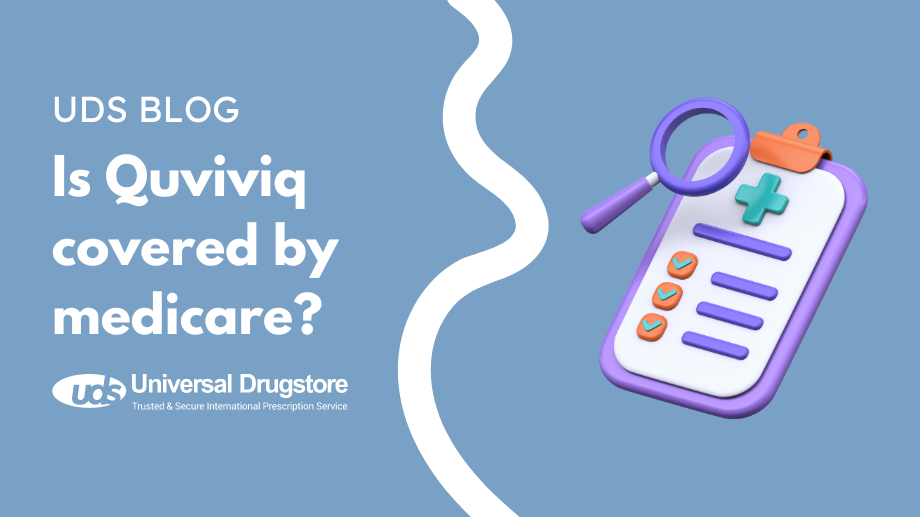Is Quviviq covered by Medicare?

Quviviq (daridorexant) is an FDA-approved prescription medication for the treatment of insomnia. It currently does not have a generic version, which can make it expensive without insurance. The average cost for a 30-day supply without coverage is around $600.
Most Medicare Part D plans do not cover Quviviq. Some plans may consider covering it if certain conditions are met or if it appears on their drug formulary. In many cases, prior authorization is required before the medication is approved for coverage. This means your healthcare provider must submit additional information to your insurance company, confirming that Quviviq is medically necessary.
If Quviviq is approved under your plan, the cost will depend on your specific coverage—including deductibles, copays, and coinsurance. Be sure to review your Medicare plan documents or speak with your plan provider to confirm your benefits and costs.
Is there a Quviviq savings card or patient assistance program?
Yes. Idorsia Pharmaceuticals offers a QSavings Card to eligible patients. If you have commercial insurance or if your insurance does not cover Quviviq, you may be eligible to pay:
- As little as $0 for your first 30-day fill
- $25 for each additional refill
To qualify, you must:
- Be 18 years of age or older
- Be a U.S. resident
- Have commercial insurance that does not fully cover Quviviq
- Not be enrolled in federal or state healthcare programs such as Medicare, Medicaid, Medigap, VA, or TRICARE
At this time, Idorsia does not offer a traditional patient assistance program for those without insurance coverage.
How can you save money on Quviviq?
- Use the QSavings Card if eligible
- Ask your provider about a 90-day supply, which may reduce pharmacy trips and costs
- Explore mail-order pharmacy options for convenience and possible savings
- Talk to your healthcare provider about alternative medications that may be more affordable or covered under your plan
What are the side effects of Quviviq?
Common side effects include:
- Headache
- Drowsiness (somnolence)
- Dizziness
- Nausea
Serious but rare side effects include:
- Severe allergic reactions (e.g., hives, facial swelling, breathing problems)
- Complex sleep behaviors (e.g., sleepwalking, sleep-driving)
- Daytime drowsiness and slower reaction times
- Worsening depression or suicidal thoughts
- Sleep paralysis, hallucinations, and cataplexy-like episodes
- Breathing difficulties, especially in patients with COPD or sleep apnea
Contact your doctor about any side effects, and report adverse reactions to the FDA at www.fda.gov/medwatch or 1‑800‑FDA‑1088.
Are there any drug-drug interactions with Quviviq?
Quviviq may interact with several medications. Let your provider know if you take:
- Other sleep medications (e.g., Ambien)
- HIV medications (e.g., indinavir)
- Benzodiazepines (e.g., alprazolam, lorazepam)
- Opioids (e.g., oxycodone, hydrocodone)
- Antifungals (e.g., itraconazole, ketoconazole)
- Antibiotics (e.g., clarithromycin, ciprofloxacin)
- Seizure medications (e.g., carbamazepine, phenytoin)
- Muscle relaxants (e.g., baclofen, cyclobenzaprine)
- Antidepressants (e.g., trazodone, amitriptyline)
- Herbal supplements (e.g., St. John’s Wort, melatonin, valerian)
- Alcohol
What should you tell your healthcare provider before starting Quviviq?
Be sure to mention if you have or have had:
- Mental health conditions or suicidal thoughts
- Substance use or addiction history
- Certain sleep disorders (e.g., narcolepsy, cataplexy)
- Breathing issues like sleep apnea or COPD
- Liver problems
- Are pregnant or planning pregnancy
- Are breastfeeding
If pregnant, consider registering with the Quviviq pregnancy registry by calling 1‑833‑400‑9611.
Related Medications
- Ambien (zolpidem)
- Sonata (zaleplon)
- Benadryl (diphenhydramine)
- Melatonin
- Lunesta (eszopiclone)
- Belsomra (suvorexant)
Sources
- Quviviq – daridorexant tablet, film coated [package insert]. Idorsia Pharmaceuticals Ltd. (2023). Accessed July 2, 2024.
- Kunz, D., et al. (2022). Long-term safety of daridorexant. CNS Drugs. Accessed July 2, 2024.
- Mignot, E., et al. (2022). Daridorexant Phase 3 trial results. The Lancet. Accessed July 2, 2024.
- Quviviq Medicare Coverage. GoodRx. Accessed July 2, 2024.
- Quviviq (daridorexant). Medscape. Accessed July 2, 2024.
- Kaur H, et al. (2023). Chronic insomnia. Accessed July 2, 2024.





